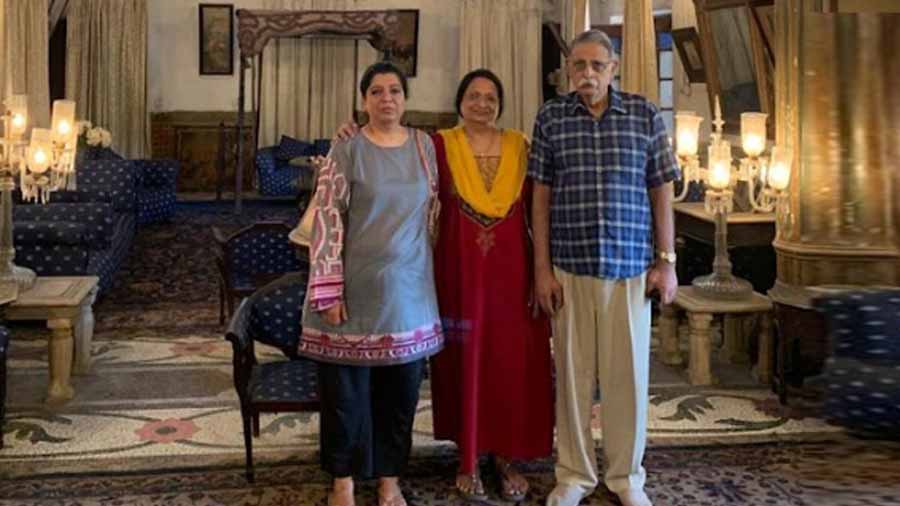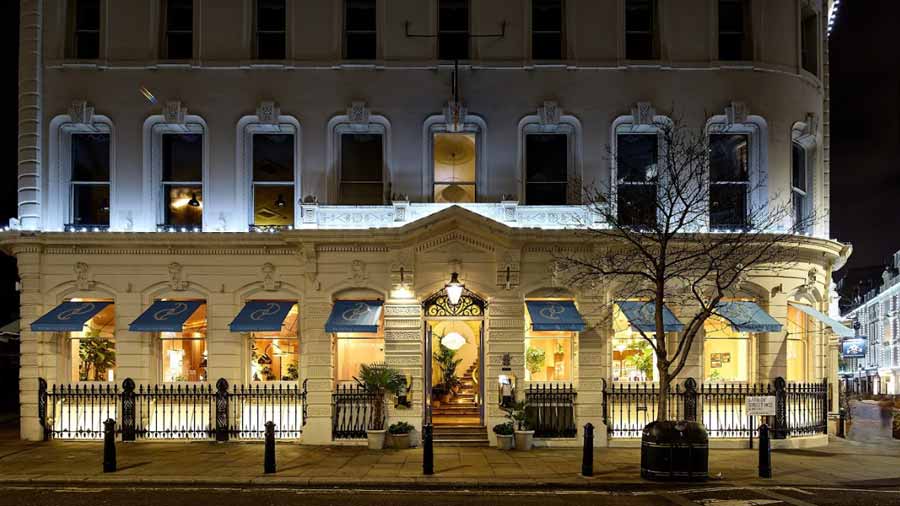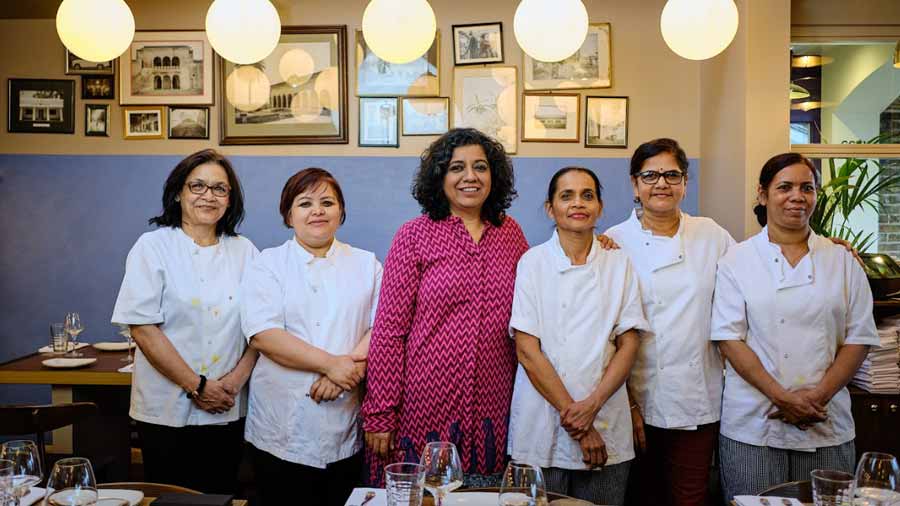This is the incredible story of Asma Khan from Kolkata, living in London, a girl who went to La Martiniere and Loreto College and is today one of the iconic chefs of the world.
Opposite her home in London was a school visited by Indian nannies looking after mostly European children. She struck up a friendship with five of these girls who began visiting her during their free time.
Asma had just begun her Supper Club on Sundays at home, frequented mostly by women from diverse backgrounds, which grew word of mouth to include a more cosmopolitan crowd, soon adding men as the women began bringing their partners.
Asma invited the five nannies to eat home-made Indian food on their off day, Sunday. At first these Indian and Nepalese girls refused to sit with her at her table, so Asma joined them on the floor and shared the excess from the Supper Club menu with them at dinner. Asma always cooked more in fear of running short and felt treating these girls to familiar food, away from home and mostly alone in London, made a lot of sense.
From these stories of hurt and survival was born the Darjeeling Express
Soon they bonded as girls, sharing stories of home, villages they grew up in, parents, husbands, children, happiness, tears, abuse, and hope. Asma heard their stories and cried with them and from these stories of hurt, deprivation and survival was born the Darjeeling Express!
She says, “I was never ambitious, I’m still not and there never was any plan of a restaurant or becoming a chef.”
Her Ammu (mother) was a great cook and Asma had learnt a lot from her. In Kolkata, her mother had a catering service from which Asma had learnt bulk cooking. Her background with a North Indian father from the landed gentry of Aligarh and a Bengali mother from Jalpaiguri, near Darjeeling, infused in her the delicacies of two different streams of cuisine. The rich and spicy North Indian food joined hands with the delicately-flavoured Bengali techniques.

Asma with her parents. A North Indian father from the landed gentry of Aligarh and a Bengali mother from Jalpaiguri, near Darjeeling, infused in her the delicacies of two different streams of cuisine.
This Kolkata cuisine she popularised in London
Kolkata is a foodie’s paradise where zamindari Bengali delicacies are as popular as Chinese food because of a vibrant Chinatown (Tangra) and the queen of dishes (the biryani) is Mughlai thanks to the erstwhile Nawab of Lucknow (Wajid Ali Shah) having relocated to Bengal many years ago.
It was this infusion of various strains in Kolkata that Asma popularised in London, first with her Supper Club, followed by her restaurant Darjeeling Express.
And so Asma rented a small place in Soho and started something she had never done before, along with five passionate girls with dreams in their hearts. The struggle of starting a restaurant is immense anywhere, and racism and narrow mindedness made it a tougher task. But people dropped in and soon the footfall increased and there was no looking back.
And then, Chef’s Table happened
After a year, something called Chef’s Table on Netflix happened and the rest is history…. The girls had no time to breathe, as they served dish after dish, the queues were long; a table at Darjeeling Express became almost unattainable.
They had to move. It was unviable and just impossible to cope up with foodies from across the world who wanted to eat at her restaurant.
Refused because she was a woman, because she was Asian
So began her hunt for a new and larger space to accommodate her customers. However, such is the decadence of discrimination that Asma was refused by several because she was a woman, she was Asian and because she did not have a male business partner to back her up.
Asma is a warrior. She and her gang of girls were not ready to accept defeat and there are in this otherwise twisted world, some good people. Therefore, they discovered their current location in Covent Garden, seating a hundred and forty guests!

In December 2020, Darjeeling Express was relocated from Soho to a new address in Covent Garden, London
Soon came the pandemic turning lives upside down, proving that we were all the same really, because every community from across the globe was affected, no one really escaped irrespective of skin colour or religion.
Restaurants across the world were in shock. Nevertheless, Asma and her diverse group of girls, now 12, from Mumbai, Hyderabad, Darjeeling and Nepal fought the battle. They began delivering home.
These unwanted girls took care of entire villages back home in India
A Michelin listing, Chef’s Table, Netflix, recognition across, Asma remains unassumingly humble. She tears up every time she narrates stories about her girls. One of them was beaten by her husband; one was exploited by her father; and one almost thrown off the hills because she was born female; her crying mother had to beg for her life.
And today, during the pandemic, these marginalised, abused, unwanted girls who had never been to school, took care of not only their families back home in India, but entire villages, sending money from their earnings in the United Kingdom. They can now speak English, following cartoons on television like Peppa Pig!
The men and the women in those communities have forgotten the struggle of these girls who went to work as domestics mostly in the Middle East, they don’t talk of how they live alone in London, together, away from husbands and children in some cases. They just bless these girls for helping them survive a pandemic they often did not even understand the scale of.
How the Vadapau liberated this girl
Because Asma believes in diversity as the key to peace, her food constantly relates that story. From luchi to biryani to phuchka, she has guests flying in from Europe, US and the Far East. Celebrities like Paul Rudd and our very own Anil Kapoor are repeat customers.
Recently one of her girls made Vadapau for Asma. A surprised Asma asked her why she had not mentioned this before. The girl narrated her story. Back home in India, her mother would make Vadapau for her father to go and sell in the market; she as a teenager would help her mother. Every day, her father would sell the Vadapau, get drunk with the money, come home and beat his wife and daughter, who remained hungry. She had always wanted to forget that nightmarish experience. Now, after so many years, she felt she had to contribute what her mother had taught her. The Vadapau. She said, “Didi, I have forgiven my father; today, after making the Vadapau I feel better.”
Asma added Vadapau, a Mumbai speciality, to her Kolkata menu. “See, food liberated this girl. That’s what keeps me going; I can now go on fighting, just for these girls,” she said.
Asma’s story is about winning
Asma was in Kolkata to shoot for Yes Chef; she can never forget her roots, she says. She was busy the last few days showcasing Kolkata in a positive light, sharing her favourite recipes on international television.

Kolkata is a foodie’s paradise where zamindari Bengali delicacies are as popular as Chinese food because of a vibrant Chinatown (Tangra) and the queen of dishes (the biryani) is Mughlai thanks to the erstwhile Nawab of Lucknow (Wajid Ali Shah) having relocated to Bengal many years ago. It was this infusion of various strains in Kolkata that Asma popularised in London, first with her Supper Club, followed by her restaurant Darjeeling Express.
End of the month, her second book will be out, dedicated to her mother (titled AMMU), who taught her the soul of food.
Asma’s story is not about food only, it is about the constant struggle of women, it is about beating the odds, it is about women supporting women, it is about winning, because women are not a minority.

